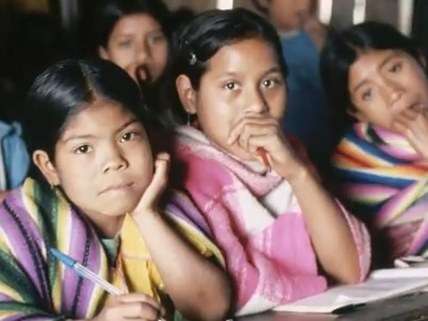Foreign Kids, Heartless Nativism, and America's Huckleberry Finn Problem
Nativist demands to deport kids appeal neither to America's humanity nor to its commitment to limited government.

Here's a question for the proud Americans demanding that the unaccompanied foreign children showing up at our borders be deported: Suppose that one of these "illegal" minors was your neighbor, living with his aunt and uncle, going to school during the day, kicking ball with friends in the evening, trying hard to put the traumatic journey from his native, violence-ridden country to America behind him. Would you, with a clear conscience, pick up the phone and turn him in?
If the answer is "no," then it is time for you to throw out your "Return to Sender" signs. Why? Because asking your government to do what you aren't heartless enough to do yourself ain't right!
America is blessed with a rich and stable neighbor on the north and oceans on the east and west. Hence, it is naturally insulated from the nasty side effects of civil wars, famines and other catastrophes outside its borders that other countries routinely confront. But unless it relocates to another planet, it can't completely cut itself off from foreign upheavals, especially those it has a hand in causing.
Anti-immigration hardliners are blaming the surge of minors—90,000 alone this year, a five-fold increase from 2011 — on America's lenient deportation policies and the prospect of "amnesty." The reality is more complicated.
The surge comes almost exclusively from three of the most dangerous countries in the hemisphere—Honduras, El Salvador and Guatemala. Why are they so dangerous? In part, because of America's illicit drug war
This trillion-dollar war puts the onus on Latin American countries to stop drugs from flowing into the US—rather than on the US to curb its own appetite. America has conditioned aid and market access on how hard these countries crackdown on drug dealers.
This hasn't dampened the drug trade one whit, but has driven it into the hands of dangerous drug cartels. Five years ago, half of Honduras was outside the government's control. In El Salvador, rival drug gangs shake down schools for recruits and money. Drug dealers even fund political campaigns in Guatemala to elect their candidates. Caught between the authorities and drug cartels are innocent civilians, especially the poor and powerless who are increasingly helpless in protecting their children.
That's why 66 percent of the kids from El Salvador and 44 percent from Honduras cite organized violence as their main reason for fleeing, according to a UN survey.
No doubt some kids are hoping to take advantage of a Bush-era law against human trafficking requiring that unaccompanied minors be given an asylum hearing and be placed in the "least restrictive setting"—such as their families—in the interim. (If their fathers are with them, they are almost certain to be turned away.)
However, because the burden of proving that they face a physical threat back home is so impossible, many of them simply melt away into the undocumented underclass rather than show up for their hearing.
A compassionate people would demand that these kids be given usable options for applying for asylum in their home countries so that they wouldn't have to undertake a dangerous journey with "coyotes"—human smugglers mixed up in the drug trade.
Instead, America is arguably experiencing its worst spasm of nativism since the early 20th Century. Then, magazines such as Judge ran cartoons depicting a Statue of Liberty with a Chinese face welcoming crime-prone and diseased immigrants. Now, protesters in towns like Murrieta, California, are turning away buses carrying these kids to shelters, accusing them of being scabies-infected law-breakers.
But such nativism will ultimately run into what University of California's John S.W. Park calls America's "Huckleberry Finn Problem." Slavery unraveled because, like Mark Twain's Huck Finn who helped Jim, a slave, escape, Americans couldn't bear to enforce anti-fugitive laws preventing blacks from fleeing to freedom. "Inflicting the law became hard," notes Park, "when there was so much evidence of common humanity." The heroes of that era are not folks like Supreme Court Justice Roger Taney, the author of the Dred Scott ruling who brilliantly argued to enforce slavery because it was the law of the land, but abolitionists like Harriet Beecher Stove who broke that law.
The same is happening now. There is no movement of private citizens turning in illegals because most Americans, even those who don't disagree with America's restrictive border policies, would feel "icky" doing so—just like Huck Finn couldn't bear to turn in Jim even though he accepted slavery as ordained by God. But sanctuary cities are cropping up in America offering safe haven, also what happened during slavery.
Laws requiring the government to do what private citizens can't bring themselves to do are wrong, especially in a country founded on the notion that a government's powers can't exceed those of its people.
Nativism, with its hectoring to enforce a cruel borderline, appeals neither to America's humanity nor its commitment to limited government – which is why it'll ultimately lose. The question is whether it'll claim these foreign kids as casualties in the meantime.
A version of this column originally appeared in the Washington Examiner. Eric Haskell of Columbia University provided valuable research assistance for this piece.


Show Comments (101)